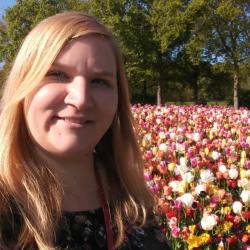Katyanne Shoemaker, Ph.D.
Education
- Ph.D. Marine Science - University of Massachusetts, School for Marine Science and Technology, 2019
- M.S. Marine Biology - University of Massachusetts, Dartmouth, 2014
- B.S. Biology - Oklahoma State University, 2011
Professional History
- 2022-present: Research Ecologist, NOAA NEFSC, Milford Laboratory
- 2020-2022: Postdoctoral Fellow, University of Rhode Island Graduate School of Oceanography
Katy is a phytoplankton ecologist who uses molecular techniques to study marine microbes and trophic interactions. In her graduate research, Katy studied the bacterial communities associated with copepods in an oligotrophic (low nutrient) subtropical system to investigate community structure and bacterially-mediated nutrient cycling in a host-associated environment. During her postdoc at the University of Rhode Island Graduate School of Oceanography, she participated in a year-long multidisciplinary drift study of Arctic climate (MOSAiC), where she studied the feeding ecology of Arctic copepods over an entire year, improving the understanding of copepod diet, especially during polar winter. This work forms a baseline for future studies of ice-associated feeding as polar climates continue to warm at an alarming rate, which decreases ice extent and allows for phytoplankton blooms to form earlier in the season.
Katy joined the Milford lab in June 2022, where she is continuing to study the feeding ecology of marine invertebrates, with a focus on sustainable bivalve aquaculture. One current project involves analyzing the genomic profiles of phytoplankton isolates commonly used in shellfish aquaculture to investigate nutrition and compare to wild food sources. She is also interested in the effects environmental change has on the feeding ecology of commercially important bivalve species fished in the North Atlantic.
Find out more about Katy's work on ResearchGate
